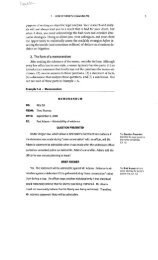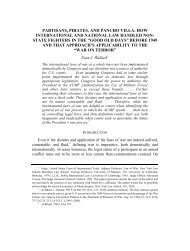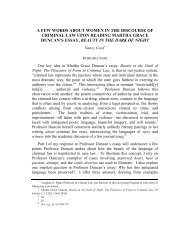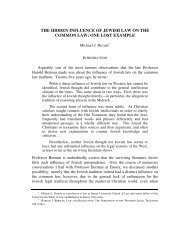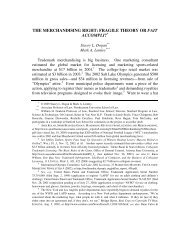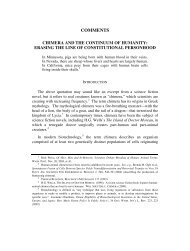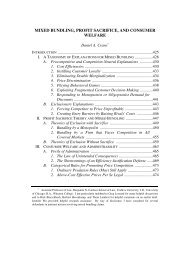life, liberty, and the pursuit of swords and armor - Emory University ...
life, liberty, and the pursuit of swords and armor - Emory University ...
life, liberty, and the pursuit of swords and armor - Emory University ...
Create successful ePaper yourself
Turn your PDF publications into a flip-book with our unique Google optimized e-Paper software.
1310 EMORY LAW JOURNAL [Vol. 57<br />
1. Defining Virtual Goods as Property Through Common Law Doctrines:<br />
Cases Concerning MMORPGs<br />
Federal <strong>and</strong> state courts in <strong>the</strong> United States have yet to determine whe<strong>the</strong>r<br />
MMORPG virtual goods are property, <strong>and</strong> if so, what type. Although state<br />
courts have had <strong>the</strong> opportunity to determine virtual property’s fate twice thus<br />
far, virtual property remains undefined as a result <strong>of</strong> procedural complications.<br />
The first opportunity arose in 2002, when a plaintiff filed suit over players’<br />
rights to sell virtual property—such as <strong>armor</strong> <strong>and</strong> weapons—acquired in an<br />
online game. 75 In BlackSnow Interactive v. Mythic Entertainment, Inc., <strong>the</strong><br />
plaintiff hired workers to play Mythic Entertainment Inc.’s virtual game to<br />
obtain virtual goods to later resell to o<strong>the</strong>r players, <strong>and</strong> sought to affirm,<br />
through <strong>the</strong> lawsuit, his right to sell his virtual property. 76 The court, however,<br />
never ruled on this claim because <strong>the</strong> lawsuit was withdrawn pursuant to a<br />
clause in <strong>the</strong> End-User Agreement requiring players to arbitrate all disputes. 77<br />
More recently, in Bragg v. Linden Research, Inc., 78 a former video game<br />
player sued Second Life for conversion, fraud, unjust enrichment, <strong>and</strong> breach<br />
<strong>of</strong> contract. Linden Research allegedly seized Bragg’s virtual plot <strong>of</strong> l<strong>and</strong> <strong>and</strong><br />
video-game account because he bought an unused parcel <strong>of</strong> l<strong>and</strong> by starting an<br />
unauthorized auction. 79 This case is currently pending, but its outcome could<br />
potentially advance current legal underst<strong>and</strong>ing on virtual property.<br />
2. Defining Virtual Goods as Property Through Common Law Doctrines:<br />
Cases Concerning Intangible Property in General<br />
Although federal <strong>and</strong> state courts have not explicitly determined whe<strong>the</strong>r<br />
virtual goods in MMORPGs constitute property within criminal law, state<br />
courts have considered whe<strong>the</strong>r intangible property in general is protectable<br />
75 BlackSnow Interactive v. Mythic Entertainment, Inc., No. 02-00112 (C.D. Cal. filed 2002); see also<br />
Sheri Qualters, A Suit over L<strong>and</strong> that Exists in a Computer, NAT’L L.J., Oct. 23, 2006, at 6.<br />
76 Qualters, supra note 75.<br />
77 Blacksnow Interactive: The Documents, VIRTUAL ECON. RES. NETWORK, http://virtual-economy.org/<br />
blog/blacksnow_interactive_<strong>the</strong>_docu (last visited Mar. 3, 2007). O<strong>the</strong>r scholars claim that Blacksnow<br />
Interactive did not have <strong>the</strong> funding to see <strong>the</strong> case through. See Mat<strong>the</strong>w Lee, Online Role Play Games—The<br />
Legal Response, 4 HERTFORDSHIRE L.J. 72, 74 (2006).<br />
78 Bragg v. Linden Research, Inc., 487 F. Supp. 2d 593 (E.D. Pa. 2007).<br />
79 Qualters, supra note 75. Linden Labs claims that Bragg exploited a vulnerability in <strong>the</strong> game. Id.



